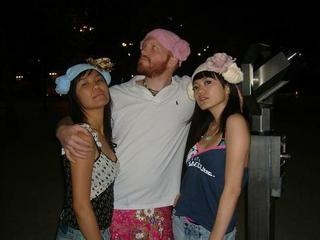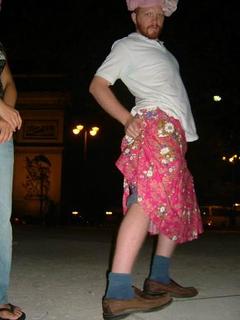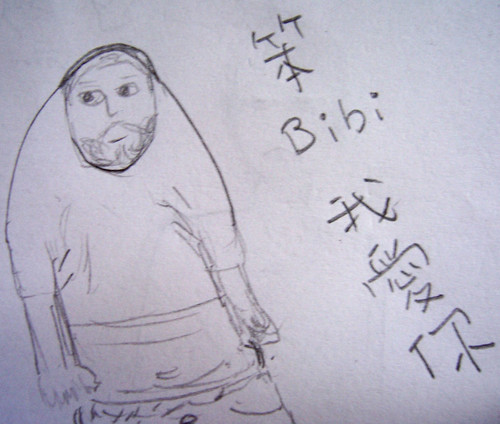Walking the Elysian Fields at night...
 The metro pulled up to the platform and it was packed with people, because there had been fireworks at La Defense earlier that night. We pushed our way into the congested car, crammed up against each other. I struggled to pull my arm up and look at my watch, then I looked at Fanfan as she rocked gently back and forth with the crowd as the train wobbled through the tunnel. I turned my watch to her, and she gasped. I nodded.
The metro pulled up to the platform and it was packed with people, because there had been fireworks at La Defense earlier that night. We pushed our way into the congested car, crammed up against each other. I struggled to pull my arm up and look at my watch, then I looked at Fanfan as she rocked gently back and forth with the crowd as the train wobbled through the tunnel. I turned my watch to her, and she gasped. I nodded.“Nous sommes un peu en retard,” I said, stating the obvious. We had left when we supposed to be arriving to meet our friends for Nino’s birthday. No surprises there.
She just smiled.
We changed lines, and as the doors shut Fanfan realized we were going in the wrong direction. At the next stop, we switched directions, passing Franklin D. Roosevelt again, then getting off at George V. Finally, thirty minutes late, we ascended from the dark into the neon and contradiction of the Elysian Fields.
“Elle nous attend devant le Gap,” said Fanfan. I asked her where the Gap was, and she smiled again. “Je suis pas sure—par là, je croix,” she said pointing in the direction we were already walking.
Her guess was better than mine.
The wide sidewalks of the Champs-Elysées are as fascinating as they are depressing. It is the perfect study of contrasts. All of the storefronts are as elegant and well-maintained as the products they sell: Mercedes-Benz, Louis Vuitton, Christian Dior, McDonald’s, etc. The clubs and bars are mostly hazy and low-lit, like mysterious art swamps or murky, black-light space terrains. Yet, the urine scented sidewalks outside are littered with broken bottles and paper bags. There is a sense of filth in the air that hovers over the walkways.
Fanfan and I walked briskly on, through the river of people moving en masse in the opposite direction, with other people flitting here and there like minnows. A man was standing with his back to us, screaming at a night club owner who had apparently done him wrong. He had a bottle of wine in the hand that waved out in front of him, pointing his finger as he yelled. As we passed him, he sat down in the only space open on a crowded bench, and all of the people scattered like scared flies on a sandwich when a hand’s coming down. He stopped yelling abruptly as he passed out of my peripheral vision. Fanfan turned and chuckled. I looked back and saw three policiers standing before the man, calmly questioning his presentation.
“T’es sure alors que le Gap est là-bas?” I asked, pointing again in the direction we were walking.
“Pas du tout,” answered Fanfan.
I said maybe we should turn around, but she said she really had a feeling that it was up ahead. I told her that girls (especially girlfriends) are always right.
Sure enough, she was right. We passed under some scaffolding, and there on the other side stood the Gap, where poor little Nino sat glaring at us. We apologized, and she feigned disapproval—or, rather, half-genuine disapproval, half-sarcastic.
I let Fanfan explain everything in Chinese—things are much easier for me that way—we sat and talked for a couple of minutes. I gave Nino a letter I had written about twenty minutes before we left. Then, Fanfan decided she was thirsty, as was I, and—in an effort to let Fanfan smooth things over with Nino as well as get in touch with Lumi—I went to McDonald’s to get her an orange juice and myself a bottle of water. When I got back, we started off going in the direction we had come from, and Nino decided she wanted ice cream.
As she and Fanfan descended into the belly of the giant Monoprix that stood like the bow of some giant, concrete luxury ship on the corner, I looked for a trashcan to toss our empty cups in. I walked in circles around the area in front of Monoprix, searching behind a bus stop and a telephone booth. There was no trash can.
When I turned, I noticed a song I like blaring from one of the shops and glanced around to see from where it came. A large black spot caught my eye, and I noticed that standing by one of the benches stood a woman completely covered in a black burka.
Before this background several stories high of spotlights, red-lit rooms, and giant promotional posters bursting with colors stood this little woman in black with two little eyes that looked back at me. She never moved, she just looked at me.
I walked two blocks, realizing why there is so much trash on the ground everywhere: there are no trashcans! Every other rue and boulevard has a trash receptacle, it seems, every fifty yards or so, yet from the Gap on up I never saw one of the little green trash hoops that I see everywhere else. I finally ended up using the boxed-in trashcans on a restaurant terrace.
Walking by myself, I was without distraction—which is probably why I was willing to go so far without just adding to the rest of the trash around me—I just watched people pass me. Once when I was a kid, my mom told me I was very observant, and it’s stuck with me. I’ve always tried to notice things that other people don’t when they pass by—which isn’t to say that I do, rather to say that I like to try when I’m walking alone.
I was passed by a group of six girls making noise, clanking pots and pans. They were walking behind one girl costumed with a mop wig, pillow breasts and posterior, painted face, and different color socks. It was her bachelorette party. This is something I’ve noticed here, bachelor(ette) celebrations are not so much for the soon-to-be-married as they are at the expense of those persons. On my birthday, I saw another guy wearing a sandwich board that said he was getting married. He was dressed as a girl and was at the command of about four of his friends.
These girls, banging pans and screaming orders at their festooned friend, were just part of the spectacle of the Champs-Elysées.
The other actors in the Champs-Elysées theater are the sans abris—the pity peddling homeless that are everywhere, though more exaggerated on the Champs-Elysées. I don’t say this so much derogatorily as uncomfortably, seeing as I want to devote myself to aiding those that have less than me—starting, frankly, by doing what I haven’t been doing. I feel conflicted and inept enough when I pass the quotidian slew of homeless here in
To be blunt, there’s another side, which is to say “their” lives aren’t “our” fault. Yet, there are those honest people that were dealt a bad hand.
Case in point, the first night I was at the Champs-Elysées, there was a man walking on all fours, but his knees didn’t touch the ground. He walked like an animal. His knees were twisted backwards, like a quadruped—which is to say, when he bent his knees, his toes came up towards his pelvis, not his heels to his butt. He had a flat-bottomed bowl that he hit with his hand as he walked and it skidded down the sidewalk. He would take about three steps and flick the bowl that would jingle ahead of him up the sidewalk. He smiled the whole time.
I don’t know if it’s possible for someone to be double-jointed in the knees, so I don’t know if he could fake what he was doing. Seeing it, though, was indescribably rending because of the millions of thoughts that run through you’re mind.
I didn’t see him the night of Nino’s birthday, though. The first beggar I passed a large Arab lady with a pastel blue headscarf whom I had also seen the first time I was there. She was sitting on the sidewalk, in the same place across from the storefronts. Her right leg was stretched out unbent, but her left leg ended abruptly at the knee. She had even provided a hole through which everyone can see the end of the nub and the long thick scar on the tip. I watched everyone pass her. The scores of rich Arabs passed her too—one lady with a black headscarf closed tightly around her chin and a long flowing robe muttered something to her as she passes, but I couldn’t hear it.
I mention that not because this is a commentary on some sort of Arab hypocrisy or malevolence. It’s just what I saw. Two people that most here in the West presume would have so much in common—a common cause and conviction—were so far apart.
This is one of the most important lessons I’ve learned from traveling and living abroad: the nationality-union or culture-union myth that says people from one place or one background naturally cohere to one another. The truth is that we’re all just as (un)likely to get along with someone foreign to us as we are to someone from our hometown.
I went back to meet Fanfan and Nino. The song was still blaring from the Virgin Megastore, but the lady enveloped in the black burka was gone. I leaned against the wall outside the Monoprix, and the bachelorette parade passed me again. This time, however, there were four guys walking with them, and the whole group was speaking Arabic.
Fanfan and Nino came out after a couple of minutes with a little cup of Ben & Jerry’s. We walked down toward l’Arc de Triomphe passed the cinemas and the world renowned bar Queen. It started to drizzle as we approached, and I started to get my hopes up that we might not get to play the Queen Game for Nino’s birthday—she had had a whole night and an hour in front of the Gap to think about what she was going to make us do, and I wasn’t looking forward to it.
We passed another of the sans abris in front of the giant make-up emporium Sephora.
It looks as though the half-person is standing waste deep in a hole in the sidewalk, like it’s supposed to be a magic trick or something. It doesn’t move at all, only rests with its forehead on the pavé.
Lumi and two of her friends visiting from

 We laughed, and we took the costumes off. We walked down into the subway and said our goodbyes as we headed to different lines. As we made our way home, wet from the rain, I didn’t remember much of anything that was said the whole evening. My head was so full of images: the ritzy, the sordid, the bright lights, the black burka, the poverty, the side-show acts, and the wealth. As we rumbled back to our apartments that night, the exhibition at the Champs-Elysées continued, as I’m sure it does this very minute and all the time, and I’m glad not to be near it.
We laughed, and we took the costumes off. We walked down into the subway and said our goodbyes as we headed to different lines. As we made our way home, wet from the rain, I didn’t remember much of anything that was said the whole evening. My head was so full of images: the ritzy, the sordid, the bright lights, the black burka, the poverty, the side-show acts, and the wealth. As we rumbled back to our apartments that night, the exhibition at the Champs-Elysées continued, as I’m sure it does this very minute and all the time, and I’m glad not to be near it.




1 Comments:
This comment has been removed by a blog administrator.
Post a Comment
<< Home